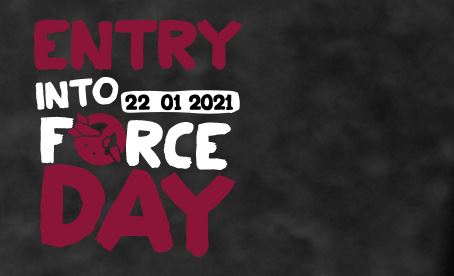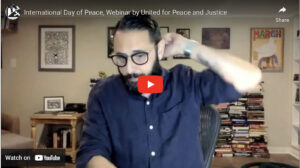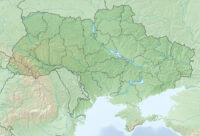On January 22, 2021, people around the world celebrated entry-into force of the United Nations Treaty on the Prohibition of Nuclear Weapons (TPNW). Spanning the globe, at least 150 events, included protests, bannering at nuclear facilities, ringing of church bells, vigils, and a variety of zoom events.
The TPNW prohibits the possession, development, testing, use and threat of use of nuclear weapons for the 52 countries that have so far ratified it. Entry-into-force of the TPNW was hailed by United Nations Secretary-General António Guterres as “a major step toward a world free of nuclear weapons”. Gutierrez “call[ed] on all countries to work together to realize this vision, for our common security and collective safety”. Regrettably the TPNW has been rigorously opposed by the United States and other nuclear armed states, as well as those allied states under “nuclear umbrellas.”
On January 15, in advance of two milestones: the entry-into-force of the TPNW on January 22; and the 75th anniversary of UN General Assembly Resolution 1(1), the very first resolution of the United Nations, the Coordinating Committee of the Abolition 2000 Global Network to Eliminate Nuclear Weapons issued a statement to welcome the new treaty into the body of international law regarding the illegality of such weapons and to remind all states of their 75-year obligation to disarm. UN General Assembly Resolution 1(1), adopted on January 24, 1946, established a commission of the UN Security Council to ensure: “the elimination from national armaments of atomic weapons and all other major weapons adaptable to mass destruction”. (UFPJ recently joined Abolition 2000 as an affiliated network.)
Writing in the Honolulu Star Advertiser, our good friend Ann Wright noted that entry-into-force of the TPNW took place just four days after the Martin Luther King, Jr. national holiday. She wrote: “In his Nobel Peace Prize acceptance speech in December 1964, King said, ‘Somehow we must transform the dynamics of the world power struggle from the negative nuclear arms race which no one can win, to a positive contest to harness man’s creative genius for the purpose of making peace and prosperity a reality for all of the nations of the world. In short, we must shift the arms race into a “peace race.’
Also writing from Honolulu in celebration of the TPNW’s entry-into-force, Helen Jaccard, project manager of the Golden Rule peace boat, reminded us: “The nuclear missile attack scare in the islands three years ago compelled many of the people of Hawaii to join worldwide efforts to abolish nuclear weapons.”
Writing about the TPNW, Veterans for Peace past President and UFPJ Coordinating Committee member Gerry Condon declared: “The U.S. must take immediate actions to step back from the brink of nuclear war, and to show leadership in the worldwide effort to eliminate all nuclear weapons. The future of humanity hangs in the balance.”
In a lengthy analysis, Joseph Gerson, President of the Campaign for Peace, Disarmament and Common Security, warned: “There are no guarantees that the TPNW will move any of the nuclear powers, all of which are spending vast fortunes to upgrade their nuclear arsenals and delivery systems, and whose political systems are deeply influenced by their military-industrial complexes. The authors of the Prohibition Treaty understand that there are no short cuts to universalizing adherence to the treaty. They know that road to nuclear weapons-free world is a long and difficult one.” But, he concluded: “The TPNW provides an encouraging opening. Human survival could well depend on taking advantage of it.”
Click here for more UFPJ background and analysis of the TPNW.



